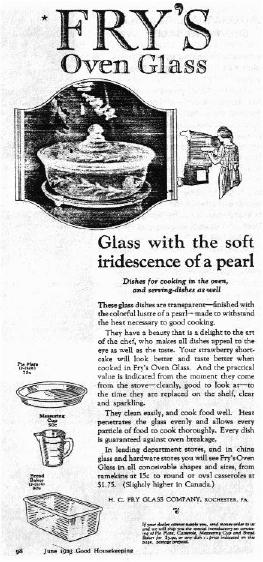National Depression Glass Association
Preserving America's Glass Manufacturing Heritage
Fry Oven Glass
by Virginia Scott
Rainbow Review Glass Journal - January 1974
The only Fry advertisements that I have found were for Fry's Oven Glass and appeared in 1922 and 1923. Most were full-page ads and some were in color.
 The H. C. Fry Glass Company of Rochester, Pennsylvania, was
organized in 1901 and operated until 1933. The company produced a fine
grade at cut glass, blanks for the cut glass trade, etched glass,
pressed and blown tableware and stemware, oven glass, Art Glass and
specialties.
The H. C. Fry Glass Company of Rochester, Pennsylvania, was
organized in 1901 and operated until 1933. The company produced a fine
grade at cut glass, blanks for the cut glass trade, etched glass,
pressed and blown tableware and stemware, oven glass, Art Glass and
specialties.
In 1922, a patent for "Heat Resisting Glass" was assigned to Fry Glass Company. The glass manufactured under this patent was a bluish-white opalescent glass which was used, from 1922 to 1933 for Fry's pressed Pearl Oven Glass, and, during 1926 and 1927 for the blown Pearl Art Glass.
Pearl Oven Glass was made in many items including custard and measuring cups, pie plates, biscuit trays, round and oval casseroles, plates, platters, trivets and other utilitarian pieces. Each ad shows some of these pieces and prices them. Several ads included menus, marking with a star the dishes that could be cooked in Oven glass and offered a free booklet, "A Weekend with Sally Whipple," which had menus and recipes. Advantages of using Fry's Oven Glass were listed as:
- Bakes evenly and quickly
- Stands oven heat
- Reduces failures
- Uses less fuel
- Looks attractive on the dining table
- Keeps food hot
- Cleans easily
- Saves washing extra dishes
Extravagant phrases were used to describe Oven Glass as shown in these excerpts from ads:
- Hues suggest the iridescence of mother-of-pearl and the deep yellow of the opal.
- These baking dishes are beautiful enough to grace the finest mahogany and to accompany the choicest linen and silver. The varying tints come and go with the play of lights upon the glass. One time you feel sure this glass was given the daintiest hues of the rainbow; another time you are certain it has a trace of amber; and again that glorious blue of an English sky is dominant.
My favorite description is "Moonbeams caught in a web of glass. This is Fry's Oven Glass!"
Pearl Art Glass, better known to collectors as "Foval" was a limited and experimental operation of the Fry company. The name, FOVAL, is said to have been coined from initials of the phrase "Fry's Oven Glass Art Line." A Fry catalogue describes the glass as "Opalescent pearl in combination with Jade green and delft blue." The main body of the piece was opal end the colors were used for handles, feet, spouts, finials and trim. Shapes were sometimes unusual, but always simple, interesting and attractive. The large variety of pieces made includes tea and coffee pots, dinnerware, stemware, candlesticks, bowls, vases, lamps and lamp shades. Pieces of Foval that are found with silver decoration were made on Fry blanks by Rockwell Silver Company, Meriden, CT. Pearl Art Glass compares favorably with Steuben's Jade and Dorflinger's Opal and these three are sometimes confused by collectors. Foval was expensive to make and was discontinued when due to its high price, it was not well accepted by the public.